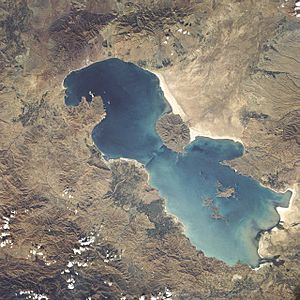Lake Urmia facts for kids
Quick facts for kids Lake Urmia |
|
|---|---|

from space, 1984
|
|
| Location | Iran |
| Coordinates | 37°42′N 45°19′E / 37.700°N 45.317°E |
| Type | Salt lake |
| Primary outflows | evaporation |
| Basin countries | Iran |
| Max. length | 140 km (87 mi) |
| Max. width | 55 km (34 mi) |
| Surface area | 5,200 km2 (2,000 sq mi) |
| Max. depth | 16 m (52 ft) |
| Islands | 102 |
Lake Urmia (Persian: دریاچه ارومیه) is a very salty lake located in the northwest of Iran. It sits between the provinces of East Azarbaijan and West Azarbaijan. This lake is the largest lake in Iran. It is also the second biggest salt lake in the world. Lake Urmia is the largest lake in the Middle East.
The lake covers an area of about 5,200 square kilometers (2,000 miles). At its biggest, it is about 140 km (87 miles) long. It is also 55 km (34 miles) wide. The deepest part of the lake is about 16 meters (52 feet) deep. Many rivers, about thirteen in total, flow into Lake Urmia from nearby mountains. However, no rivers flow out of it.
Lake Urmia is located between West Azarbaijan and East Azarbaijan provinces. The city of Tabriz is the largest city to its east. The city of Urmia is the largest city to its west. To travel between these cities, people used to go all the way around the lake. In the 1970s, a plan began to build a bridge across the lake. This project was stopped for a while. It started again in the 2000s and was completed later.
The water in Lake Urmia is very salty. The amount of salt changes with the seasons. In late Autumn, the salt concentration can be as high as 26-28%.
Sadly, Lake Urmia is getting smaller each year. This happens because the rivers that feed the lake are carrying less water.
Contents
Lake Urmia's History and Names
This lake has had different names over time. Long ago, it was called Chaychast (Persian: چیچست). Later, the Assyrian people named it Urmia. The word Urmia means "city of water." This name was first given to the city of Urmia, which is close to the lake. The lake then took its name from the city.
In the early 1900s, the lake was renamed Rezaiyeh Lake. This was after Reza Pahlavi, who was the king of Iran at that time. After the Islamic Revolution in 1979, its name was changed back to Urmia Lake.
Animals and Nature at Lake Urmia
Many different creatures live in or near Lake Urmia. These include some types of shrimps, amphibians like frogs, and birds such as flamingos and pelicans.
The edges of Urmia Lake are shallow and have a lot of mud. Various creatures live in this mud. These include snails and worms. People believe that the mud from the lake can help treat some joint diseases.
Islands of Lake Urmia
Lake Urmia has 102 islands. These islands are home to different kinds of wildlife.
Related Places
Images for kids
-
On holidays People come to see Lake Urmia around the "Shahid Kalantari" highway that still has water. The 15 km Shahid Kalantari highway is constructed by drying 85% of the boundary between the western-eastern sides of the lake. Construction of the highway has caused the northern and southern half disconnected and has made natural and fundamental changes in the hydrodynamic and ecological characteristics of the lake region.
See also
 In Spanish: Lago Urmía para niños
In Spanish: Lago Urmía para niños
 | Shirley Ann Jackson |
 | Garett Morgan |
 | J. Ernest Wilkins Jr. |
 | Elijah McCoy |






